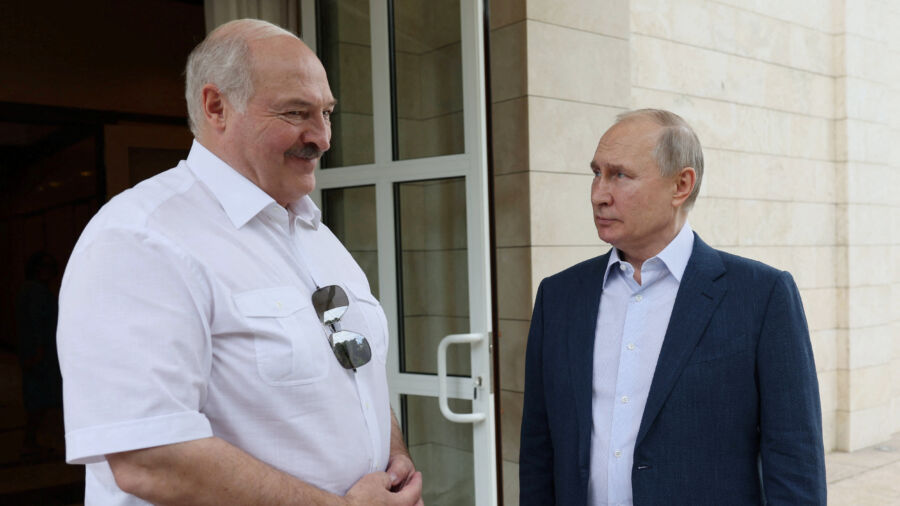Russian President Vladimir Putin said on Friday that Moscow will start deploying tactical nuclear weapons in Belarus when the necessary special storage facilities in the former Soviet republic are completed early next month.
The announcement comes several months after Putin first described plans to move tactical nuclear weapons in Belarus in March, pointing to U.S. deployment of similar weaponry at NATO bases in a number of European countries over many decades.
Belarus’ longtime authoritarian leader, Alexander Lukashenko, recently described the development as a unique chance for Minsk and Moscow to unite. Belarus, along with Kazakhstan and Ukraine, relinquished its nuclear weapons to Russia in the 1990s in exchange for security guarantees.
“Everything is proceeding as planned,” Putin said in televised remarks of his meeting with Lukashenko at his Bocharov Ruchey resort in Sochi on Russia’s Black Sea coast.
“Preparations of the relevant facilities will be completed on July 7 or 8, and we will immediately begin the activities related to the deployment of the corresponding types of weapons on your territory,” he added, according to a Kremlin transcript of his remarks.
If everything goes as planned, the deployment will mark the first time Russian tactical nuclear weapons are placed outside Russia since the fall of the Soviet Union in the 1990s.
Tactical nuclear weapons are envisioned as a means of delivering the destructive power of a nuclear weapon in a relatively limited battlefield space. These weapons are usually smaller in yield than the strategic nuclear weapons designed to destroy entire cities during the Cold War.
Lukashenko, a staunch ally of Putin who has been in power for nearly three decades, has relied on Moscow’s political and economic support to survive months of protests, mass arrests, and Western sanctions following an election in 2020 that kept him in power but was widely seen at home and abroad as rigged.
Last month, Lukashenko promised tactical nuclear weapons to any other country that wanted to join the Union State of Russia and Belarus—a supranational agreement between the two former Soviet republics that was signed in 1999 with the aim of strengthening economic and defense ties between the two neighbors.
“It is very simple: join in the Union State of Belarus and Russia,” he said during an interview on Kremlin state television on May 28, adding, “There will be nuclear weapons for everyone.” Lukashenko stressed during the interview that it was his own view—not necessarily the view of Putin.
Military Escalation
As the war in Eastern Europe between Ukraine and Russia continues to rage after more than 15 months, Putin has repeatedly raised issues with the United States and other Western nations pumping arms into Kyiv as part of an expanding proxy war aimed at bringing Russia to its knees.
Putin casts the war as a battle for Russia’s own survival in the face of what he describes as an ever-expanding NATO. He has warned the West that Moscow will not back down. He also expressed concern about the United States deploying B61 tactical nuclear warheads at NATO bases in Belgium, the Netherlands, Germany, Italy, and Turkey. Moscow is also unhappy about a reported upgrade of the B61, which was first tested in Nevada shortly after the Cuban Missile Crisis.
The United States has criticized Russia’s nuclear expansion to its neighboring ally, but has said it has no intention of altering its position on strategic nuclear weapons and also that it has not seen any signs Russia was preparing to use a nuclear weapon.
White House press secretary Karine Jean-Pierre said during a news conference in May that the Biden administration is aware of the Russia-Belarus arrangement and “will continue to monitor, certainly, the implications here.”
“This is yet another example of [Putin] making irresponsible and provocative choices,” she said. “We remain committed to a collective defense of the NATO alliance, and I’ll just leave it there.”
NATO spokesperson Oana Lungescu also denounced Putin’s plans in March, saying Moscow’s “reference to NATO’s nuclear sharing is totally misleading.”
“NATO allies act with full respect of their international commitments,” she said, adding that “Russia has consistently broken its arms control commitments.”
The war in Ukraine has triggered what both Moscow and Washington say is the deepest crisis in relations since the depths of the Cold War, with major nuclear arms control treaties unraveling and both sides denouncing each other in public.
Reuters contributed to this report.

